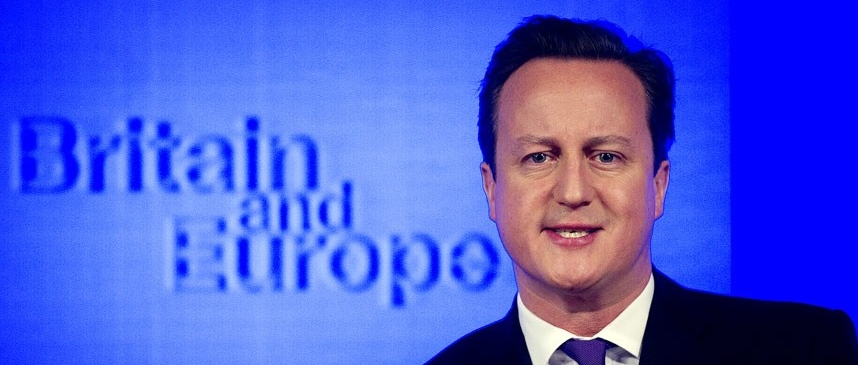
Cameron is not the only leader who should fear a British exit
The British leader has time to prevent a calamity of his own making.
Unless David Cameron changes course, the prime minister’s plans to reform the EU and persuade the British to vote to stay in it seem likely to fail.
The furore over Jean-Claude Juncker’s appointment as European Commission president is setting off a vicious spiral. The UK’s political debate becomes increasingly eurosceptic; other member states become less willing to make an effort to keep it in the club, and antagonise the eurosceptics. Mr Cameron and other EU leaders should move swiftly to de-escalate, lest the damage be irreparable.
One reason Mr Cameron lost the argument on Mr Juncker is that Britain’s standing in Europe has sunk over the past three years. Even natural allies such as Denmark, Germany, the Netherlands and Sweden have not backed him on the presidency. His predicament attracts little sympathy from EU leaders, who like neither his uncompromising style nor his threats. He told one that Mr Juncker’s appointment could make him bring forward the referendum he has promised for 2017. He has refused to discuss a UK-friendly work programme for the next five years, or important commission jobs for Britons.
Many EU leaders regard Mr Cameron as the author of his own misfortunes: he has pandered to eurosceptics in the hope of buying them off. He took his party out of the centre-right European People’s party, the EU’s most influential political grouping; legislated to prevent any transfer of power to Brussels without a referendum; and vetoed the fiscal compact treaty in December 2011, though its provisions would not have applied to the UK. Yet each time the eurosceptics come back for more. When he announced an in-or-out referendum in a speech last year, he also made the case for Britain’s continued membership. But he never followed up with a concerted effort to shift opinion.
All this has damaged Britain’s relationships in Europe. Mr Cameron cannot forge agreements on EU reform without winning allies. Still, other EU governments should think carefully about the consequences of a British exit. So far, most have not done so, seeing Britain’s eurosceptics as deranged and its government as guilty of self-harm. Carl Bildt, Sweden’s foreign minister, is a rare voice warning of the damage Britain’s exit would do to the EU’s standing, its ambition of developing strong foreign and defence policies, and its plans on trade and the single market. If other member states want Britain to stay, they should be ready to embrace reform.
Mr Cameron needs to restore British influence. In the short term, he should accept Mr Juncker gracefully (the Luxembourger is no monster) and focus on installing British candidates in crucial EU jobs. The second most important post in the commission, after that of president, is arguably that of the secretary-general, who runs the administration and has a say on draft laws. Britain has a strong candidate in Jonathan Faull, currently the commission official in charge of the single market. Mr Cameron should also ask for a Briton to become single market commissioner, though he will need to field a political heavyweight to have a chance of landing that job.
In the longer term, Mr Cameron needs to detoxify the British brand. If he and senior ministers started to make the case for the EU in the UK they would not only win friends but also make a referendum victory possible. The longer he leaves it, the harder this will be. Most of all, Britain needs to show leadership in Europe. Other countries would welcome British initiatives in areas where the UK has expertise. In the words of a friendly country’s Europe minister: “Cameron needs to show he can bring solutions to problems.” He should also demonstrate that he is serious about EU reform by spelling out his plans in more detail.
Mr Cameron’s reform ideas will not satisfy the eurosceptics who want Britain out of the EU. But they will have to be confronted if the UK is to be kept in. One bold step would be to rejoin the EPP, which would generate good will and help restore British influence. (Had Mr Cameron never left, he might have stopped the group from nominating Mr Juncker.)
Other European leaders should understand that if they want the British to stay they must help it to do so. They should not punish 60m Britons for their prime minister’s diplomatic missteps.
Charles Grant is director at the Centre for European Reform.
